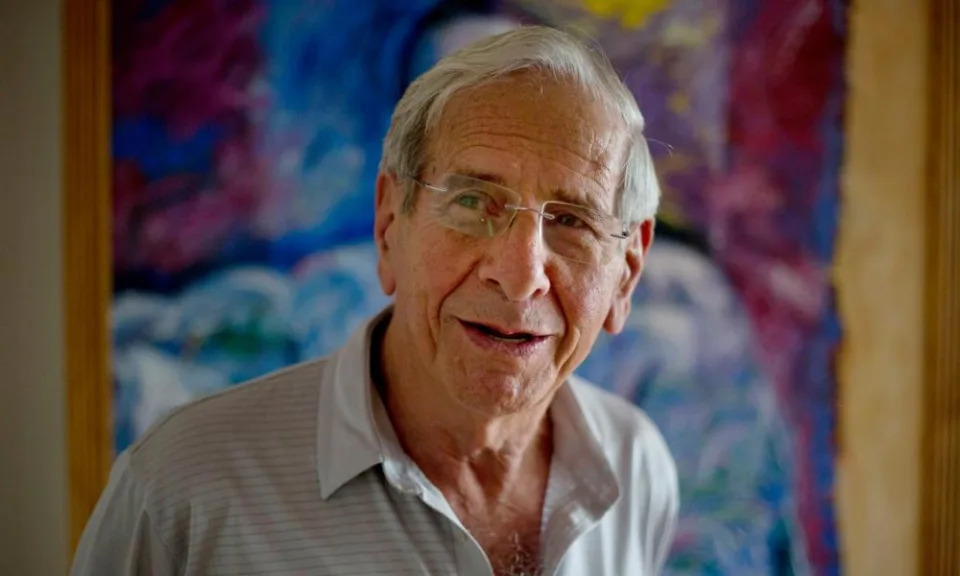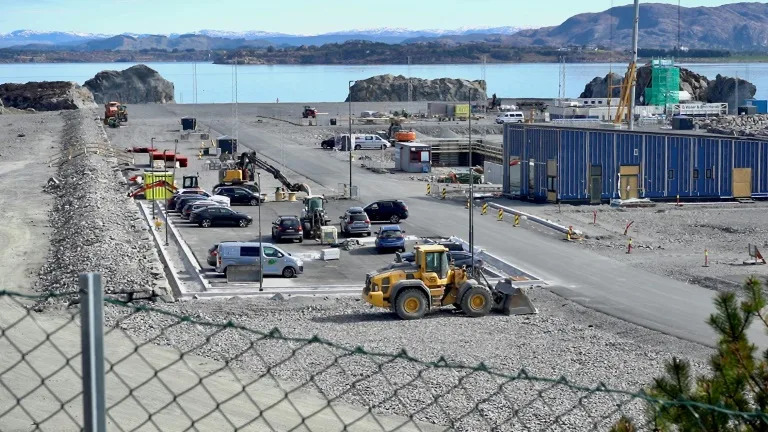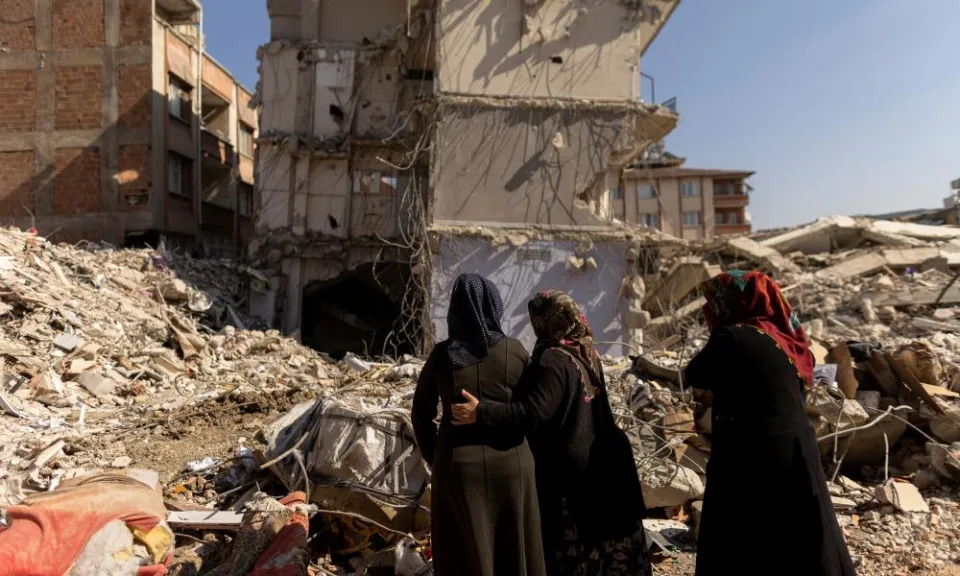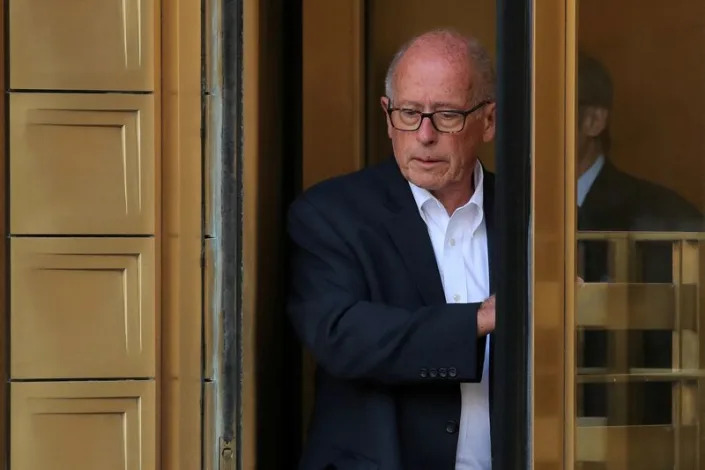'Disrespect for the people': Merrick Garland issues scathing report into LMPD practices
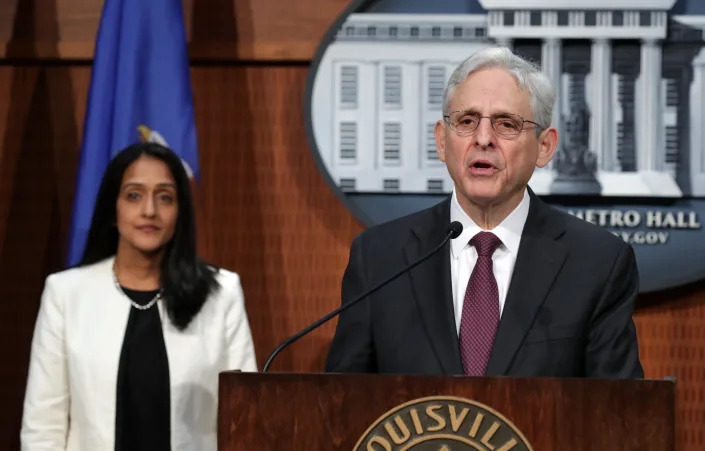
U.S. Attorney General Merrick Garland delivers the Department of Justice findings on the Investigation of the Louisville Metro Police Department and Louisville Metro Government, at Louisville Metro Hall on Wednesday, March 8, 2023. WIth Garland is Vanita Gupta, associate attorney general.
Andrew Wolfson and Phillip M. Bailey, Louisville Courier Journal
Wed, March 8, 2023
Three years after Breonna Taylor was shot and and killed in her apartment, U.S. Attorney General Merrick Garland released a blistering report Wednesday finding that the city and its police department have violated the constitutional rights of its citizens, particularly Black people.
Garland also announced Louisville has agreed “in principle” to forge a consent decree that will be enforced by a federal judge who will monitor the city’s progress in adopting reforms.
The department, for years, "has practiced an aggressive style of policing that it deploys selectively, especially against Black people, but also against vulnerable people throughout the city," Garland said during a press conference at Metro Hall. "LMPD cites people for minor offenses, like wide turns and broken taillights, while serious crimes like sexual assault and homicide go unsolved.
"Some officers demonstrate disrespect for the people they are sworn to protect," he said, adding the department found incidents of officers calling Black people “monkey, animal and boy.”
The 90-page report from the Civil Rights Division of the Department of Justice found LMPD:
Uses excessive force, including unjustified neck restraints and unreasonable use of police dogs and tasers
Conducts searches based on invalid warrants.
Unlawfully executes warrants without knocking and announcing.
Unlawfully stops, searches, detains and arrests people during traffic and pedestrian stops.
Violates the rights of people engaged in protected speech critical of policing.
Discriminates against people with behavioral health disabilities while responding to crises.
The report also offered 36 remedial measures it says LMPD should adopt on serving search warrants and other areas identified as deficiencies.
Garland said the police's behavior erodes trust in the department and is an “affront to the people of Louisville, who deserve better” and to officers who respect the law and Constitution.
DOJ police department investigations:Are Department of Justice investigations a path to police reform or 'a war on cops'?
Louisville Mayor Craig Greenberg promised to cooperate with the DOJ.
“To those people who've been harmed, on behalf of our city government, I'm sorry,” said Greenberg, who took office two months ago. “You deserve better.”
The investigation spanned the years 2016 to 2021, when Greg Fischer was mayor. He issued a statement Wednesday defending his administration and noting that federal officials lauded his "proactive leadership."
"Today’s findings – paired with those from the independent audit by Hillard Heintze that I initiated in 2020 – presents Louisville with an opportunity to be a national leader and a model in building a truly just public safety system. I believe good police officers will welcome this report as an opportunity to more easily meet the oath they swore to protect and serve our community and improve their daily job performance and profession."
Consent decrees in other cities have placed police departments under federal review for as long as 10 years.
The report was the culmination of an investigation announced 23 months ago.
Garland said investigators interviewed hundreds of police, citizens, clergy, defense lawyers, judges and others, and reviewed thousands of hours of police body camera videos.
Garland noted LMPD has already instituted some reforms, such as banning “no-knock” searches.
But he and his deputies said LMPD continues to stop drivers, especially Black motorists, on pretexts and is twice as likely to search them as whites.
They also are twice or more likely to be stopped for having only one working headlight or excessively tinted windows.
Associate Attorney General Vanita Gupta said consent decrees have dramatically reduced use of force by police in Seattle, Albuquerque and Baltimore.
Kristen Clarke, assistant attorney general for Civil Rights, said in the wake of Taylor’s death and subsequent national protests, Americans across the country are demanding greater accountability and reforms for law enforcement.
“People in Louisville deserve constitutional policing,” she said. “They deserve policing that is fair and non-discriminatory.”
Clarke outlined a bleak picture of how the Louisville police department operates and how elected officials charged with overseeing the department failed to do their jobs as well.
She said, for instance, Louisville police selectively targeted Black people compared to their white counterparts.
“Our investigation found that the police department and city government failed to adequately protect and serve the people of Louisville, breached the public's trust and discriminated against Black people through unjustified stop, searches and arrests,” she said.
The investigation found that Black residents were disproportionately impacted for various infractions such as loitering and traffic stops, in which federal officials said they were 50% more likely to be searched than white drivers.
“This pattern of racial discrimination fuels distrust and impedes the community's confidence in LMPD and their law enforcement operations,” Clarke said.
DOJ indictments in Breonna Taylor case:Experts predict who has the edge, the feds or the charged officers
The FBI also has been investigating Taylor’s killing separately. The DOJ also has charged several Louisville officers in separate cases since 2020, including four former LMPD personnel in early August on charges either of lying on the warrant obtained to search Taylor’s home, obstructing investigators or — in the case of ex-Detective Brett Hankison — firing bullets that entered a neighboring apartment.
Taylor’s mother, Tamika Palmer, previously tweeted that “I can’t wait for the world to see Louisville Police Department for what it really is,” in response to the DOJ’s announced investigation.
Breonna Taylor fact check:Separating the rumors from the facts
No officers were directly indicted and prosecuted by Kentucky Attorney General Daniel Cameron’s office for Taylor’s death, though several were later fired or submitted resignations. Hankison was charged at the state level in 2020 with wanton endangerment for firing bullets that went into an apartment neighboring Taylor's that was occupied by three people, and a jury acquitted him in March.
City officials estimated in 2021 that reforms at LMPD prompted by the DOJ investigation could cost Louisville up to $10 million annually, and the city directed some federal American Rescue Plan funds to that area. The changes have already included a new Accountability and Improvement Bureau at LMPD and launch of an early warning system for officers after years of delays.
Interim LMPD Police Chief Jacquelyn Gwinn-Villaroel vowed to make the department the most "trusted, trained and transparent" in the United States.
Greenberg, in an apparent reference to the city's rate of murders and other crimes, said: "We need our officers to solve crimes while treating people with dignity and respect."
He called the report a "painful picture of our department's past" and promised to change "how we recruit, train and manage our more than 1,000 officers."
Reporter Billy Kobin contributed to this report.
This article originally appeared on Louisville Courier Journal: Breonna Taylor case: DOJ releases investigation into Louisville police
Louisville police discriminate against Black people, US Justice Dept says

Four current and former Louisville police officers arrested over 2020 shooting of Breonna Taylor
Wed, March 8, 2023
By Sarah N. Lynch and Rami Ayyub
WASHINGTON (Reuters) -The Louisville, Kentucky, police force routinely discriminates against Black residents, uses excessive force and conducts illegal searches, the U.S. Justice Department said on Wednesday, following a probe prompted by Breonna Taylor's killing in 2020.
The department's findings come nearly two years after U.S. Attorney General Merrick Garland launched the civil rights probe into the department, whose officers shot Taylor dead after bursting into her apartment on a no-knock warrant, as well as the Louisville-Jefferson County government.
The probe found a wide-ranging pattern of misconduct by police, including using dangerous neck restraints and police dogs against people who posed no threat, and allowing the dogs to continuing biting people after they surrendered.
At a news conference, Garland said the department had reached a "consent decree" with the Louisville police, which will require the use of an independent monitor to oversee policing reforms.
"This conduct is unacceptable. It is heartbreaking. It erodes the community trust necessary for effective policing," Garland said. "And it is an affront to the people of Louisville, who deserve better."
It is the first probe of U.S. policing begun and completed by the Biden administration, which had promised to focus on racial justice in law enforcement after a spate of high-profile police killings of Black Americans. The deaths of Taylor and George Floyd, in particular, drew national outrage and sparked the Black Lives Matter protests in 2020.
"I don't even know what to say today. To know that this thing should never have happened and it took three years for anybody else to say that it shouldn't have," Taylor's mother, Tamika Palmer, told a news conference after the findings were released.
The investigation found the police department used aggressive tactics selectively against Black people, who comprise roughly one in four Louisville residents, as well as other vulnerable people, such as those with behavioral health challenges.
Police cited people for minor offenses like wide turns and broken taillights, while serious crimes like sexual assault and homicide went unsolved, the probe found, adding minor offenses were used as a pretext to investigate unrelated criminal activity.
Some Louisville police officers even filmed themselves insulting people with disabilities and describing Black people as "monkeys," the Justice Department said. It also found that officers quickly resorted to violence.
Louisville Mayor Craig Greenburg told reporters the Justice Department's report brought back "painful memories" and vowed to implement reforms.
"Our city has wounds that have not yet healed and that's why this report... is so important and so necessary," he said.
MORE INVESTIGATIONS
Taylor, a 26-year-old emergency medical technician, was asleep in bed with her boyfriend on March 13, 2020, when Louisville police executing a no-knock warrant burst into her apartment.
Her boyfriend fired at them believing they were intruders and police returned fire, fatally shooting Taylor.
The killings of both Taylor and Floyd prompted the Justice Department in 2021 to open civil rights investigations, known as "pattern or practice" probes, into the police departments in Louisville and Minneapolis to determine if they engaged in systemic abuses. The results of the Minneapolis review have not yet been released.
Under Garland's leadership, the Justice Department has sought to reinvigorate its civil rights enforcement program, an area civil rights advocates say was left in tatters by former U.S. President Donald Trump.
During the Trump administration, for instance, former Attorney General Jeff Sessions moved to curtail the use of consent decrees with police departments, saying they reduced morale.
The Justice Department has since restored their use, and launched multiple civil rights investigations into police departments, local jails and prisons across the country.
The department's 90-page investigative report recommended 36 measures for Louisville police, including revamping policies on search warrants, new use-of-force training for officers, requiring body-worn cameras to be activated, documenting all police stops, and improving civilian oversight.
In 2021, Garland also announced new policies for federal law enforcement agencies including the FBI, which now prohibit them from conducting "no-knock" entries like the one used against Taylor by local police.
In August, federal prosecutors charged four current and former Louisville, Kentucky, police officers for their roles in the botched 2020 raid.
One of those, former Louisville detective Kelly Goodlett, pleaded guilty to federal criminal charges that she helped falsify the search warrant that led to Taylor's death.
(Reporting by Sarah N. Lynch, additional reporting by Rami Ayyub and Dan Whitcomb; Editing by Scott Malone and Deepa Babington)
'The time for terrorizing the Black community with no repercussions is over.' Reactions to LMPD investigation
14
Lucas Aulbach, Louisville Courier Journal
Wed, March 8, 2023
U.S. Attorney General Merrick Garland spoke Wednesday alongside several officials from Louisville and the Department of Justice to reveal findings from a nearly two-year investigation into the city's government and police department.
The 90-page report details issues and violations the department found in its review of Louisville Metro Police, along with recommendations for moving forward.
Live updates:Findings of federal investigation into LMPD after Breonna Taylor's killing
More reactions:DOJ's report into Louisville police: How people are responding on social media
Here are some key moments and quotes from the Wednesday press conference and from community members about the findings.
Merrick Garland, US attorney general

U.S. Attorney General Merrick Garland delivers the Department of Justice findings on the Investigation of the Louisville Metro Police Department and Louisville Metro Government, at Louisville Metro Hall on Wednesday, March 8, 2023.
“This conduct is unacceptable. It is heartbreaking. It erodes the community trust necessary for effective policing, and it is an affront to the vas majority of officers who put their lives on the line every day to serve with honor – and it is an affront to the people of Louisville.”
"To the officers of LMPD: The Justice Department is acutely aware of the integral role that law enforcement officers play in our society and the dangers you face to keep your community safe – so it is imperative that your police department sets you up for success."
Vanita Gupta, associate attorney general
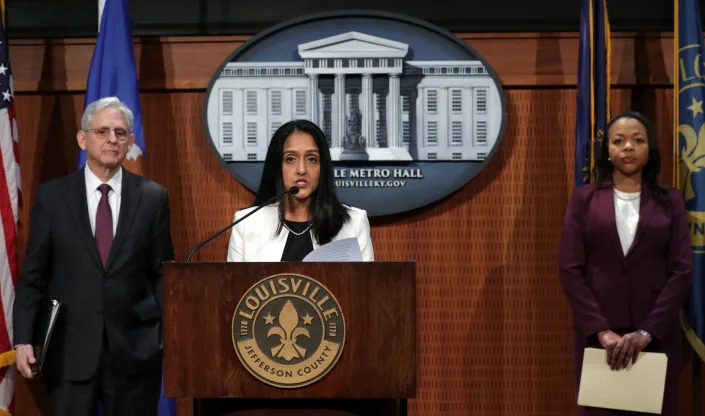
Vanita Gupta, associate U.S. attorney general, speaks at a press conference where the Department of Justice delivered findings on the Investigation of the Louisville Metro Police Department and Louisville Metro Government, at Louisville Metro Hall on Wednesday, March 8, 2023. WIth Gupta are U.S. Attorney General Merrick Garland, left; and Kristen Clarke, assistant attorney general for civil rights.More
"LMPD’s ability to serve and protect the people of Louisville has been compromised and the findings are deeply troubling and sobering. So we are committed to working with Louisville on a path forward to constitutional policing and stronger police-community trust."
Kristen Clarke, assistant attorney general

"These findings are not based on any one incident or event. They turn on evidence showing long-standing dysfunction at LMPD. The pattern or practice of unlawful conduct compromises LMPD’s ability to serve and protect safely, constitutionally and effectively. Instead, LMPD has practiced an extreme, misdirected and counterproductive style of policing."
"Our efforts were exhaustive. We talked to hundreds of people across the city. We rode with officers in their cars on patrol. We spoke with city and union officials, judges and attorneys, advocacy groups, religious leaders and community members from different walks of life. And along with our experts, we've reviewed thousands of documents regarding LMPD’s enforcement activities, and we watch thousands of hours of body-worn camera footage."
Craig Greenberg, Louisville mayor
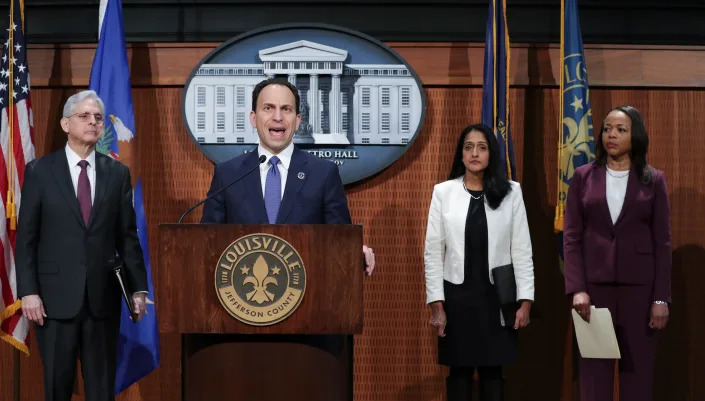
Louisville Mayor Craig Greenberg made remarks as he was joined by U.S. Attorney General Merrick Garland, left, and Assistant Attorneys General Vanita Gupta and Kristen Clarke, right, as they announced the findings of a sweeping investigation of the Louisville Metro Police Department at Metro Hall in Louisville, Ky. on Mar. 8, 2023.
"I know some people are surprised and horrified to hear stories about certain officers operating in ways that are so counter to our values as a community. All of this is really hard to hear and hard to accept. It's infuriating. I understand that.
"I also know there are people who are not surprised to hear the findings in this report, because they see this report as confirmation of complaints they've made about their own interactions with law enforcement, sometimes for years. Many of those spoke out and felt dismissed or devalued. Now, the United States Department of Justice is essentially saying 'Yes, in many cases, you were right. And you deserve better.' That's a powerful thing. I understand that, too.
"And I know there are people who will look at this report, and they'll be eager to find some way to minimize it. or dismiss it. They'll say it's all politics, or that you could find examples like this in any city. No – this is not about politics or other places. This is about Louisville. This is about our city, our neighbors and how we serve them."
Jacquelyn Gwinn-Villaroel, interim LMPD chief
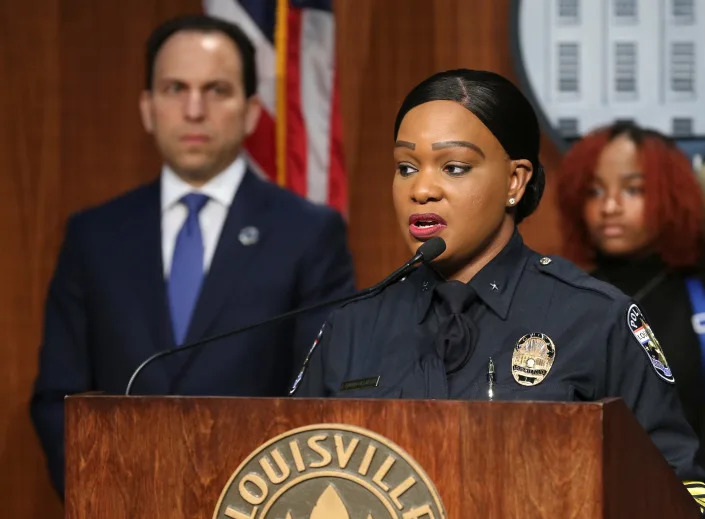
Interim LMPD Chief Jacquelyn Gwinn-Villaroel speaks during a press conference to announce that the department will begin removing the firing pins from weapons used in crimes.
"This is an extremely challenging and pivotal point for our city, our department and for our officers. Now that the DOJ has concluded their investigation and presented their findings, we will continue our efforts in improving public safety in this beautiful city called Louisville and making LMPD the premier police department in the country."
Tamika Palmer, mother of Breonna Taylor

Tamika Palmer, right, and her sister Bianca Austin listened to speakers at Jefferson Square Park following the announcement that the police officers involved in the killing of Breonna Taylor will face federal charges in Louisville, Ky. on Aug. 4, 2022. Palmer is Taylor's mother.
"What was confirmed today is that I should still be able to to pick up the phone and reach my oldest daughter Breonna. It took us having to fight day in and day out for years simply because I deserved justice for my daughter’s murder to kickstart this investigation, but today’s findings are an indicator that Breonna’s death is not vain. Our fight will protect future potential victims from LMPD’s racist tactics and behavior. The time for terrorizing the Black community with no repercussions is over."
Ben Crump, civil rights attorney who represented Breonna Taylor

Attorney Ben Crump pumped his fist in the air at Jefferson Square Park following the announcement that the police officers involved in the killing of Breonna Taylor will face federal charges in Louisville, Ky. on Aug. 4, 2022.
“The family of Breonna Taylor is encouraged by the findings released today by Attorney General Merrick Garland and the Department of Justice Civil Rights Division revealing a pattern of biased policing and a long list of constitutional violations by the Louisville Metro Police Department.
“These findings, and LMPD’s expected cooperation with the DOJ’s recommended remedial measures, will help protect the citizens of Louisville and shape its culture of policing. It’s steps like these, and involvement of the Attorney General and the DOJ’s Civil Rights Division, that will move our nation forward and prevent future tragedies like the one that took the life of Breonna Taylor and the countless others who have been killed unnecessarily by law enforcement.”
Greg Fischer, former Louisville mayor (2011-2022)

Former Mayor Greg Fischer on Dec. 23, 2022.
"Today is another important inflection point to honor the pain of 2020 by further acknowledging – and continuing to act on – the fact that our community deserves a new era of public safety. This era requires the leadership of the many good officers who have dedicated their lives to keep us safe and are committed to working in partnership with the community to develop a new form of constitutionally sound policing embraced by all our city’s residents.
"Since the summer of 2020, I have emphasized that public safety in Louisville and across America is at an inflection point. Without fundamental and widespread changes in police culture, resources, resident involvement and resulting police-community legitimacy, our city and nation will continue to needlessly endure tragedy after tragedy. National events since the summer of 2020 bear witness to this conclusion."
Hannah Drake, Louisville poet and activist

Poet Hannah Drake speaks Friday afternoon at Jefferson Square, one year after the first protest for Breonna Taylor, the former emergency room technician, who was killed by LMPD during a botched raid in March 2020. The anniversary and tributes continue through Saturday.
"The reform is only as good as the people executing them. So here’s my question that I really want to know. ... how many of those same officers are still employed at LMPD? What changes? Are those people going to magically go home and say you know what, let’s stop calling Black people monkeys and animals."
Tim Findley Jr., pastor at Kingdom Fellowship Christian Life Center
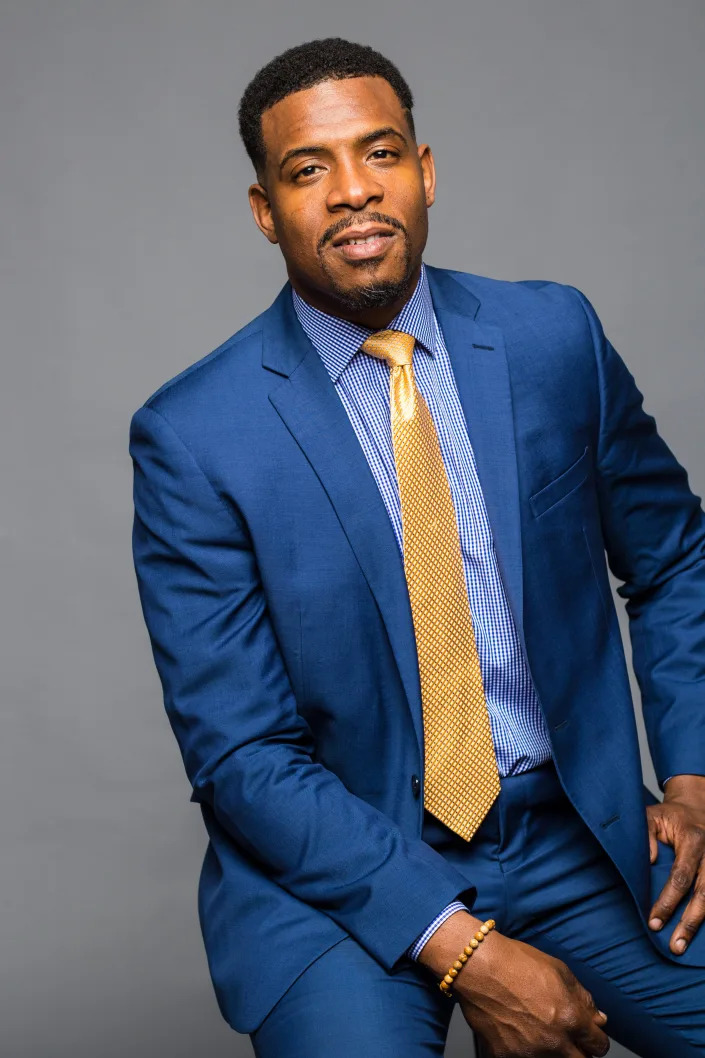
Tim Findley Jr.
“Locally, what people have been saying for years has now been elevated on a national stage."
“What I found most interesting was that they talked about Black people. They didn't say Black and brown. They didn't say other communities. Black people were targeted and terrorized. And that is a huge, huge reality that leadership, that the FOP must deal with, that Black people have been terrorized in Louisville for a very long time.”
Sadiqa Reynolds, former CEO of the Louisville Urban League

Sadiqa Reynolds made remarks at Jefferson Square Park following the announcement that the police officers involved in the killing of Breonna Taylor will face federal charges in Louisville, Ky. on Aug. 4, 2022.
"It is what we said it was and worse. We know every officer is not corrupt but we recognize that the system is, so even the good ones do harm in their attempts to stand behind the shield in silence. The system does not allow for the humanization of Black people. There is nowhere in this city where we can be safe, not even in our homes. Policing itself is flawed but this department worked hard to go backward over the past several years. It works against Black residents, and authorizes and condones our abuse. There have been no significant consequences and no real accountability. There can never be justice without truth. And for many of us, the unrest has settled into our souls because we could not get anyone to give us the full truth. There must be some sort of racial reckoning for the Black community in Louisville. We deserve acknowledgment and accountability from the leaders in this city. I think I speak for many Louisvillians when I say, I am thankful for this thorough investigation and report. Now, I look forward to the hard work of change."
Ted Shouse, Louisville attorney

Ted Shouse has been a criminal defense lawyer for 21 years.
"Systemic racial discrimination by LMPD is recognized and proven in this report. Many of us had known this for years and today that knowledge is validated and respected. ... It is only through the recognition of these facts, that we can hope to have any path forward."
Morgan McGarvey, U.S. congressman for Louisville
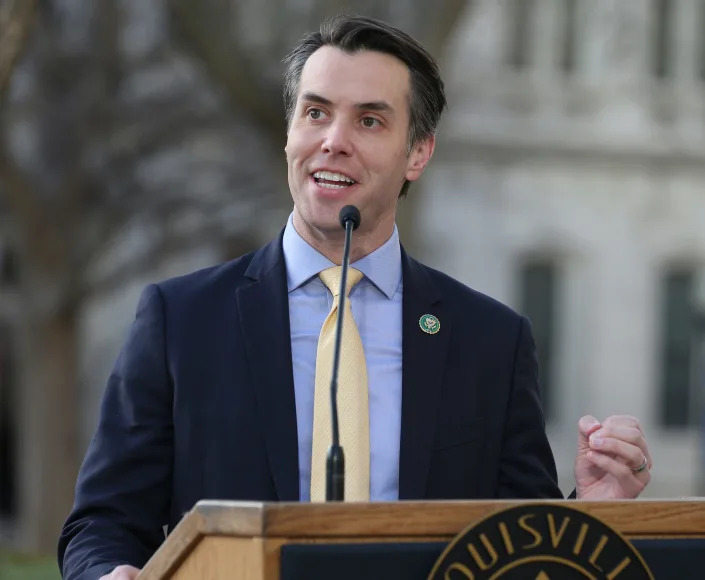
Senator Morgan McGarvey speaks during a rally to support Ukraine on front of Metro Hall on Friday, February 24, 2023.
“Excessive use of force and racial profiling in the Louisville Metro Police Department will continue to plague our community until we take decisive action to create true, lasting change. We simply cannot afford to wait."
“Today’s report is a long overdue step in the right direction to hold our law enforcement accountable, but it does nothing to undo the centuries of systemic injustice Black communities have endured. We must commit to change, accountability, and justice for Breonna Taylor, George Floyd, Tyre Nichols, Tamir Rice, Michael Brown, and the far too many others who were killed by police.”
Shameka Parrish-Wright, VOCAL-KY director and a protest leader
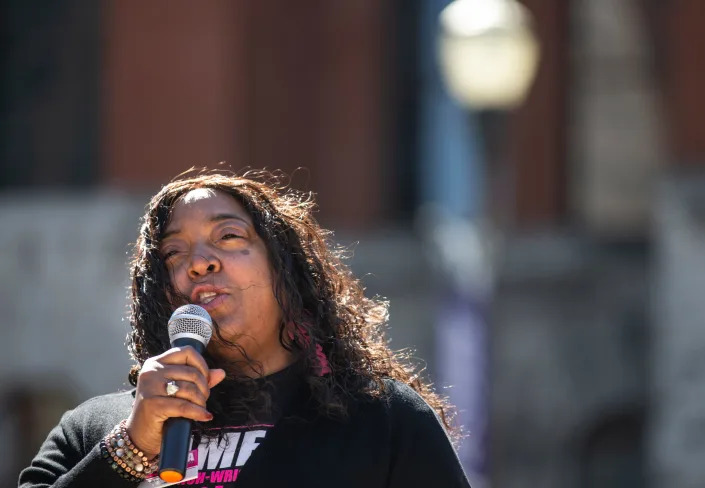
Louisville mayoral candidate Shameka Parrish-Wright spoke in Jefferson Square Park on the two-year anniversary of Breonna Taylor's death at the hands of Louisville Metro Police officers. March 13, 2022
"It really felt good to be acknowledged, to be heard, and all that gaslighting they've been doing to us – to have the their boss's boss, the top of policing, acknowledge that Louisville has done us wrong for so long ... LMPD, we believe, needs a whole complete overhaul, but a consent decree is a step in the right direction to start dealing with that."


